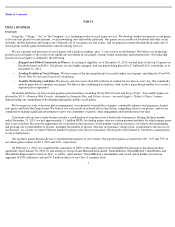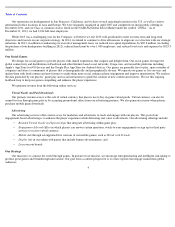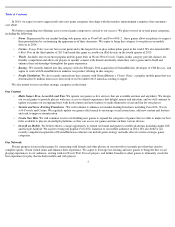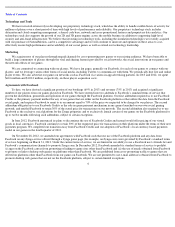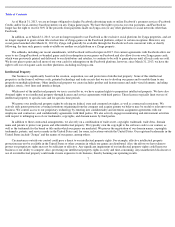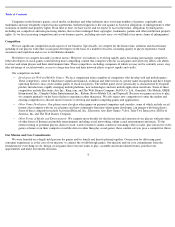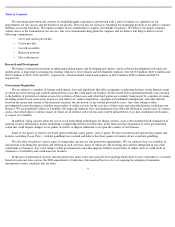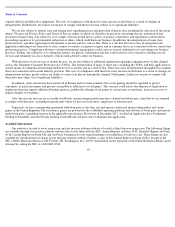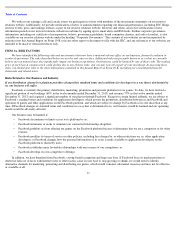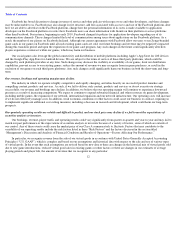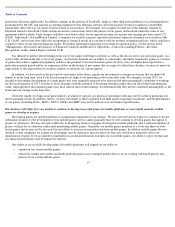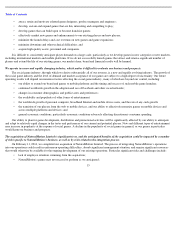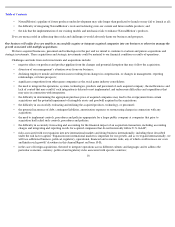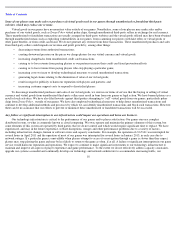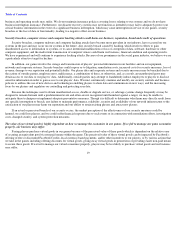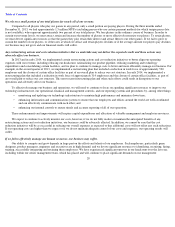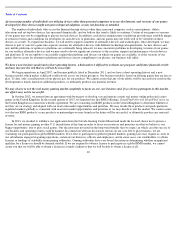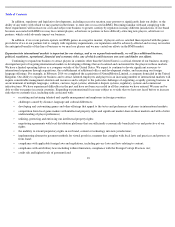Zynga 2013 Annual Report Download - page 17
Download and view the complete annual report
Please find page 17 of the 2013 Zynga annual report below. You can navigate through the pages in the report by either clicking on the pages listed below, or by using the keyword search tool below to find specific information within the annual report.
Table of Contents
period may fluctuate significantly. In addition, changes in the policies of Facebook, Apple or other third party platforms or accounting policies
promulgated by the SEC and national accounting standards bodies affecting software and virtual goods revenue recognition could further
significantly affect the way we report revenue related to our products. For example, we recognize revenue net of the amounts retained by
Facebook related to Facebook Credits and local-currency transactions sold to the players of our games on Facebook under the terms of our
agreement with Facebook. Such changes could have an adverse effect on our reported revenue, net income and earnings per share under U.S.
GAAP. Additionally, NaturalMotion Limited, a company we recently acquired, reported its historical financial statements in accordance with
U.K. GAAP, and we may have difficulty in reporting its financial results in accordance with our revenue recognition policies, which could have
a negative effect on our reported financial results. For further information regarding our revenue recognition policy, see the section titled
“Management’s Discussion and Analysis of Financial Condition and Results of Operations—Critical Accounting Policies—Revenue
Recognition” in this Annual Report on Form 10-K.
It is difficult to predict when bookings from one of our games will begin to decline, as well as the decay rate for any particular game. As a
result of this decline in the life cycle of our games, our business depends on our ability to consistently and timely launch new games or versions
of games that achieve significant popularity and have the potential to become franchise games. If decay rates are higher than expected in a
particular quarterly period and/or we experience delays in the launch of new games that we expect to offset these declines, we may not meet our
expectations or the expectations of securities analysts or investors for a given quarter.
In addition, we have made in the past and we may make in the future, significant investments or changes in strategy that we think will
benefit us in the long term, even if our decision negatively impacts our operating results in the short term. For example, in early 2013, we
decided to discontinue development of certain games that were originally expected to be released and then meaningfully contribute to bookings
for the second quarter of 2013, in order to focus on games with the potential of becoming franchise games that can drive long-term enterprise
value. Although these discontinued games may have offered short-
term bookings, we determined that they did not contribute meaningfully to the
brand and our strategy in the long term.
Given the rapidly evolving social game industry in which we operate, our historical operating results may not be useful in predicting our
future operating results. In addition, metrics we have developed or those available from third parties regarding our industry and the performance
of our games, including DAUs, MAUs, MUUs, MUPs and ABPU may not be indicative of our financial performance.
Our business will suffer if we are unable to continue to develop successful games for mobile platforms or successfully monetize mobile
games we develop or acquire.
Developing games for mobile platforms is an important component of our strategy. We have devoted and we expect to continue to devote
substantial resources to the development of our mobile games, and we cannot guarantee that we will continue to develop games that appeal to
players or advertisers. We may encounter difficulty in integrating features on games developed for mobile platforms that a sufficient number of
players will pay for or otherwise sufficiently monetizing mobile games. Generally, our mobile games monetize at a lower rate than our web-
based games and we may not be successful in our efforts to increase our monetization from mobile games. In addition, mobile games that we
develop, or that companies we acquire are developing, may be delayed or may not meet our forecasts, which may negatively affect our
monetization strategy. If we are unable to implement successful monetization strategies for our mobile games, our ability to grow revenue and
our financial performance will be negatively affected.
Our ability to successfully develop games for mobile platforms will depend on our ability to:
13
•
expand on our current mobile games;
•
effectively market new mobile and multi-platform games across multiple mobile devices to our existing web-based players and
players of our current mobile games;


